Introduction
Artificial Intelligence (AI) and Machine Learning (ML) are not merely buzzwords; they are the cornerstone of innovation within the Amazon Web Services (AWS) ecosystem. As organizations strive to harness the potential of these transformative technologies, understanding their intricacies becomes paramount. AI simulates human intelligence, while ML focuses on enabling systems to learn from data, evolving without explicit programming. AWS stands at the forefront of this technological revolution, offering robust infrastructure that empowers businesses to develop, train, and deploy AI and ML models with unprecedented efficiency.
With a significant majority of companies investing in AI initiatives, the imperative to grasp these concepts is clear. This article delves into the essential AWS services, best practices for deployment, the importance of certifications, and real-world applications that illustrate how AI and ML can redefine operational excellence and drive competitive advantage in an ever-evolving digital landscape.
Understanding AI and ML in the AWS Ecosystem
AI, ML, and AWS are pivotal drivers of technological progress. AI encompasses the simulation of human intelligence by machines, enabling them to think and learn autonomously. In contrast, ML is a specialized branch of AI focused on creating systems that learn from data and enhance their performance over time, independent of explicit programming.
For entities aiming to leverage these technologies, a deep understanding of their distinctions and applications is essential. AWS offers a powerful infrastructure for the development, training, and deployment of AI ML AWS models at scale. This capability not only aligns technological initiatives with overarching business goals but also propels digital transformation and increases operational efficiency.
As firms continue to invest in AI—evidenced by 91.5 percent of surveyed entities committing resources to AI initiatives—grasping these concepts becomes indispensable for achieving competitive advantage in a rapidly evolving landscape. Furthermore, AWS has recently introduced the Storage Browser for Amazon S3, an open-source interface component that allows users to interact with their data stored in S3. According to Matheus Guimaraes, Senior Developer Advocate for AWS, 'Storage Browser for S3 eases the strain on developers looking to provide end users with access to data in S3, and it is designed so that end users—such as customers, partners, and employees—can efficiently work with data regardless of their familiarity with Amazon S3 or AWS.'
This tool exemplifies how AWS is enhancing its offerings to support AI ML AWS applications.
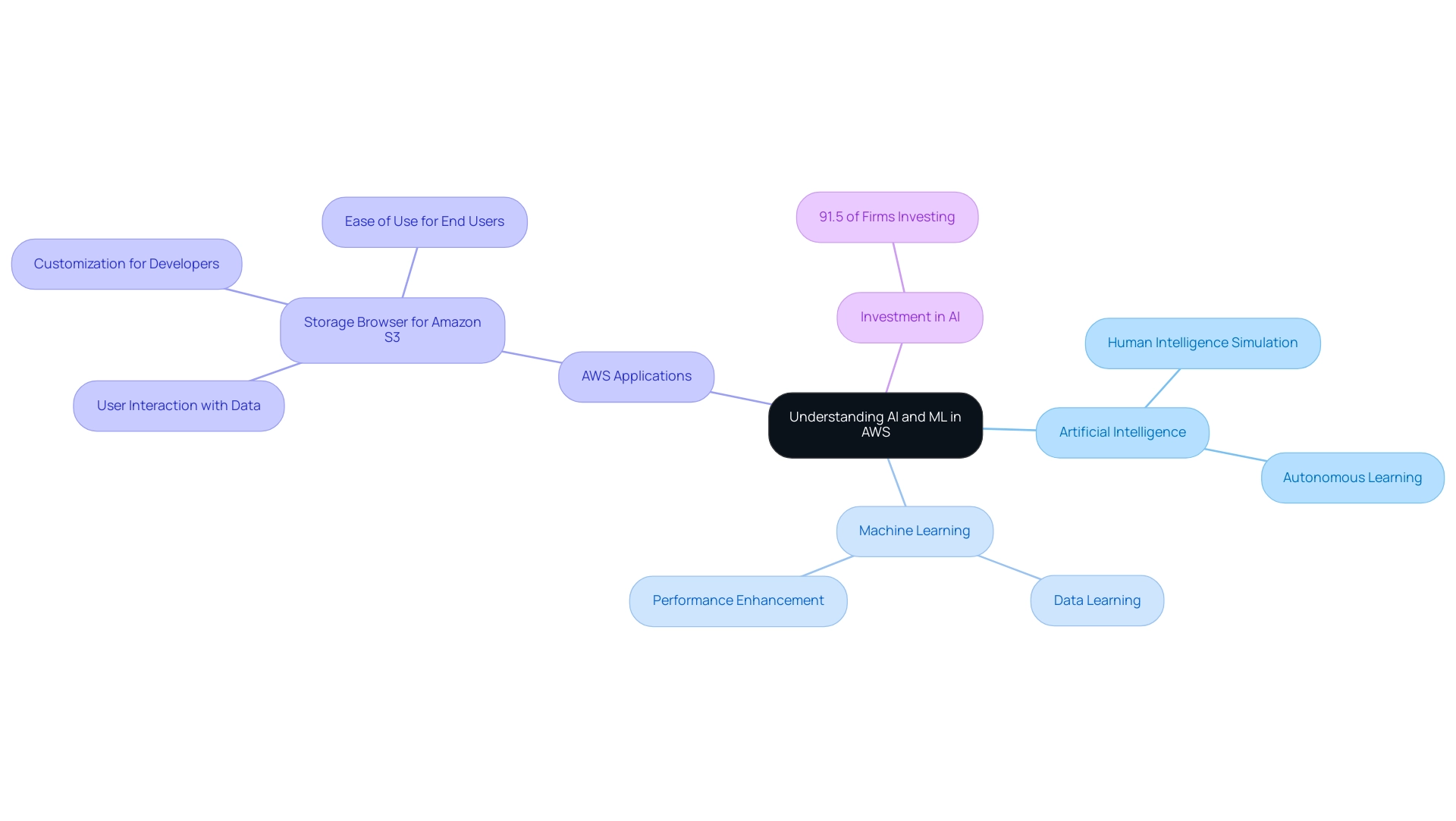
Key AWS Services for AI and ML Implementation
Amazon Web Services provides a variety of services tailored for AI ML AWS implementation that organizations can leverage. Key services comprise:
- Amazon SageMaker: A fully managed service that allows developers to create, train, and deploy artificial intelligence models swiftly and effectively. SageMaker includes built-in algorithms and support for popular frameworks like TensorFlow and PyTorch.
- AWS Lambda: A serverless compute service that allows users to run code in response to events, which is ideal for running machine learning inference at scale.
- Amazon Rekognition: Provides image and video analysis, enabling developers to add image recognition capabilities to their applications without needing machine learning expertise.
- Amazon Comprehend: A natural language processing service that uses ML to find insights and relationships in text.
Leveraging these services can facilitate faster project cycles and enhance the overall quality of AI ML AWS solutions.
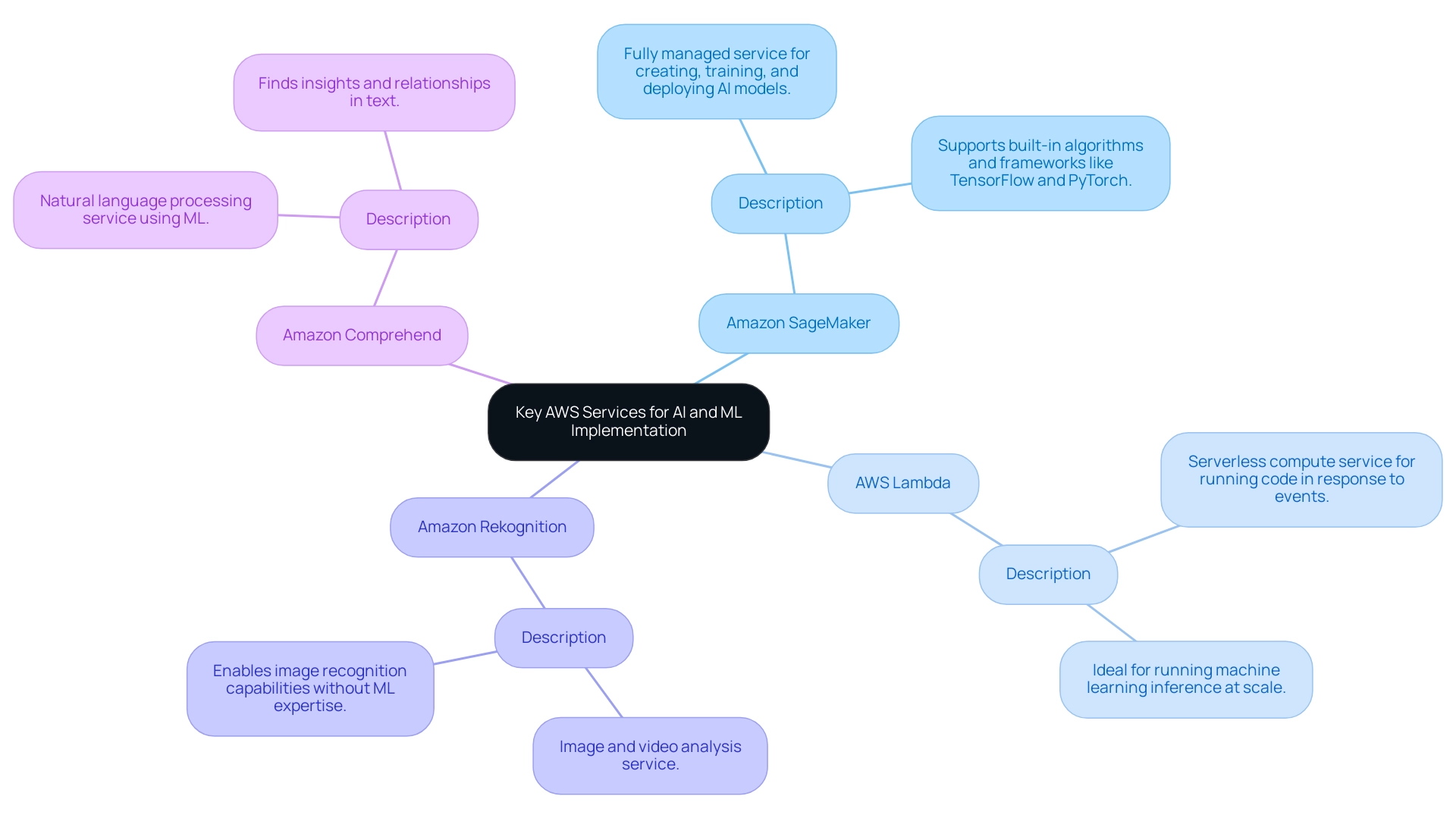
Best Practices for Deploying AI/ML Workloads on AWS
To effectively deploy AI/ML workloads on AWS, entities should consider the following best practices:
- Adopt MLOps Practices: Integrating Machine Learning Operations (MLOps) helps in managing the ML lifecycle, ensuring that deployments are consistent and scalable.
- Monitor Performance: Implement monitoring tools to track model performance and detect anomalies, which is crucial for maintaining the integrity of AI applications.
- Optimize Costs: Utilize AWS Cost Explorer and other financial management tools to analyze and optimize spending on AI/ML resources.
- Set Up Automated Pipelines: Automate the data ingestion, training, and deployment processes to reduce manual errors and increase operational efficiency.
- Implement Security Best Practices: Ensure data security and compliance by following AWS security guidelines and implementing access control measures.
By adhering to these best practices, entities can enhance the reliability and effectiveness of their AI ML AWS initiatives.
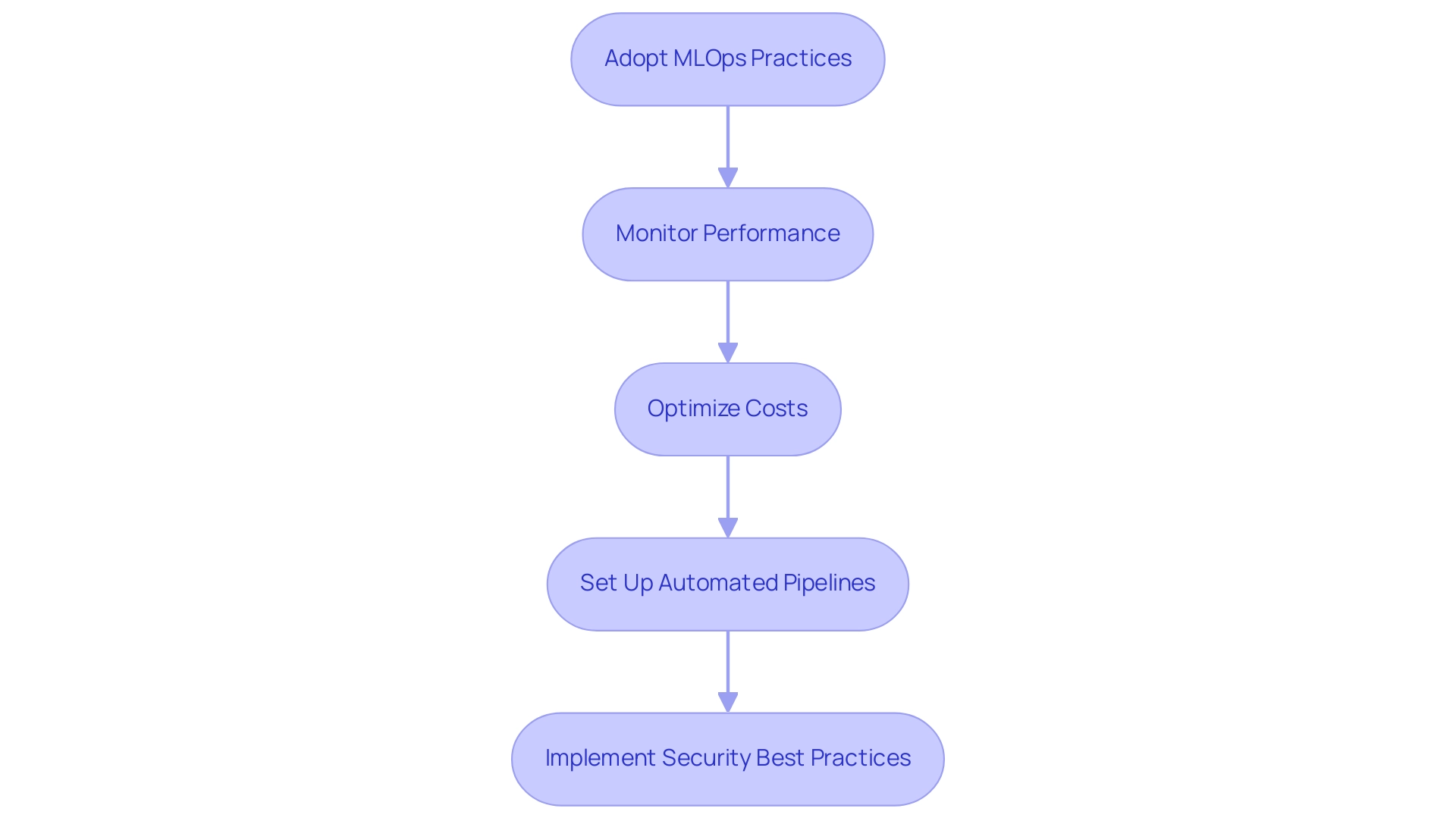
The Importance of AWS AI/ML Certifications
AWS offers a variety of certifications that validate skills in AI ML AWS, which can be instrumental for professionals in enhancing their careers. The key certifications consist of:
- AWS Certified Artificial Intelligence – Specialty: This certification validates expertise in building, training, tuning, and deploying models for artificial intelligence.
- AWS Certified Solutions Architect – Associate: While broader in scope, this certification covers essential knowledge for integrating solutions involving ai ml aws within AWS environments.
- AWS Certified Data Analytics – Specialty: This certification focuses on data analytics, which is a critical component of successful AI and ML implementations.
Obtaining these certifications not only enhances an individual's marketability but also equips companies with skilled professionals capable of effectively implementing AI ML AWS strategies.
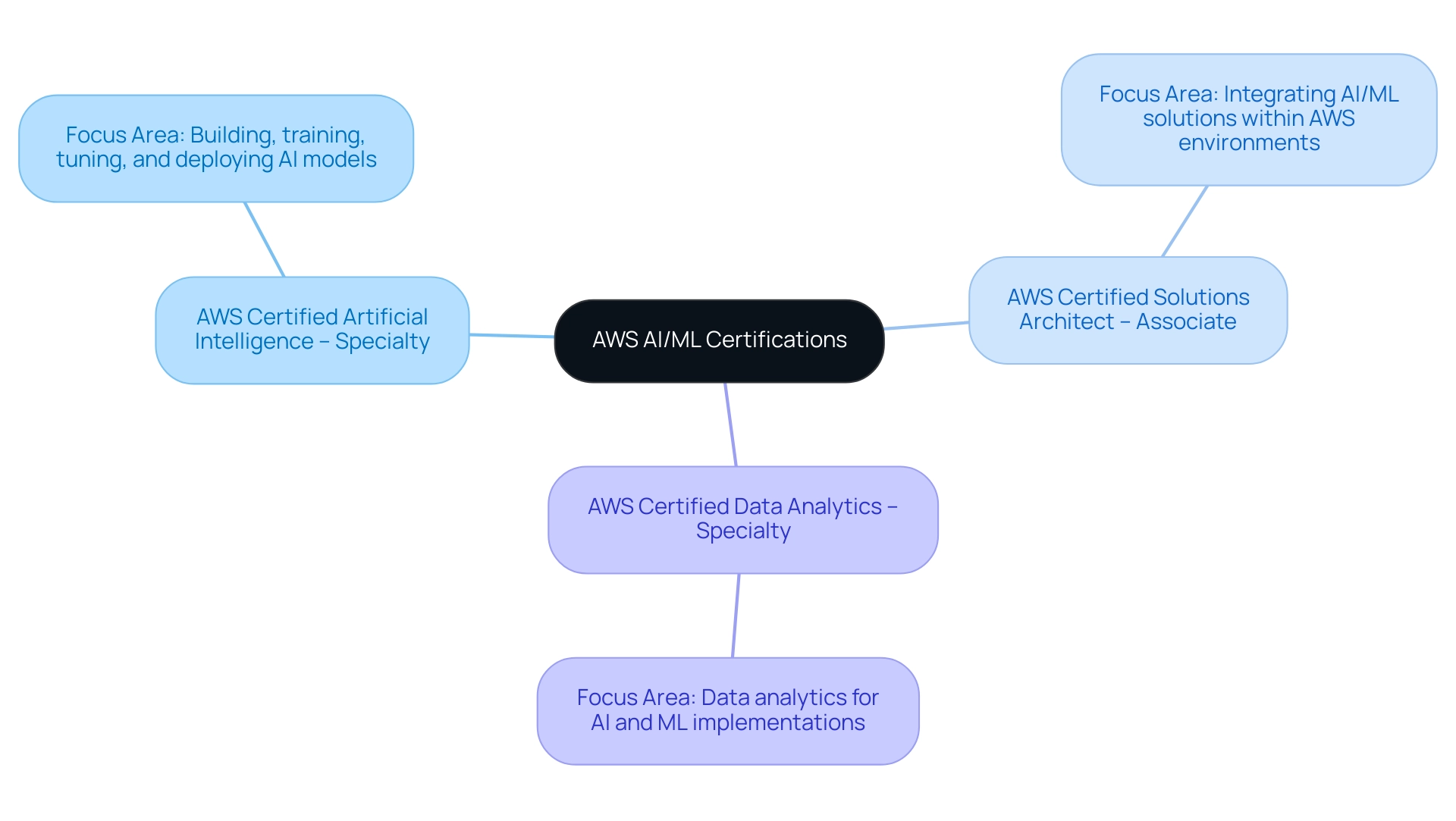
Real-World Applications of AI and ML on AWS
A multitude of organizations have effectively utilized AI, ML, AWS, and computational capabilities to foster innovation and enhance operational efficiency. Significant instances comprise:
- Netflix: This streaming behemoth utilizes advanced analytical algorithms on AWS to customize user experiences, examining viewing patterns and preferences. This personalization strategy has significantly boosted customer satisfaction and retention rates.
- Airbnb: By utilizing AI technologies, Airbnb optimizes its pricing strategies and enhances customer service, creating a more customized experience for its users.
- NASA: The agency employs computational models on AWS for predictive maintenance of its spacecraft, which not only enhances operational efficiency but also guarantees safety during missions.
These case studies serve as compelling illustrations of the transformative power of AI, ML, and AWS technologies when effectively integrated within the AWS ecosystem. They provide critical insights for organizations aiming to adopt similar strategies, showcasing how AWS can facilitate significant advancements in efficiency and customer engagement.
Moreover, it's important to note that AWS's support for Internet Explorer ended on 07/31/2022, reflecting its evolving technology landscape. AWS is committed to portability and interoperability, which enhances the strategic advantages of using its platform for AI, ML, and AWS applications. As AWS states, 'We remain committed to providing customers with a choice of diverse AI technologies, along with secure and compliant ways to build their AI applications throughout the development lifecycle.' This commitment reinforces the authority and credibility of the claims made in these case studies.
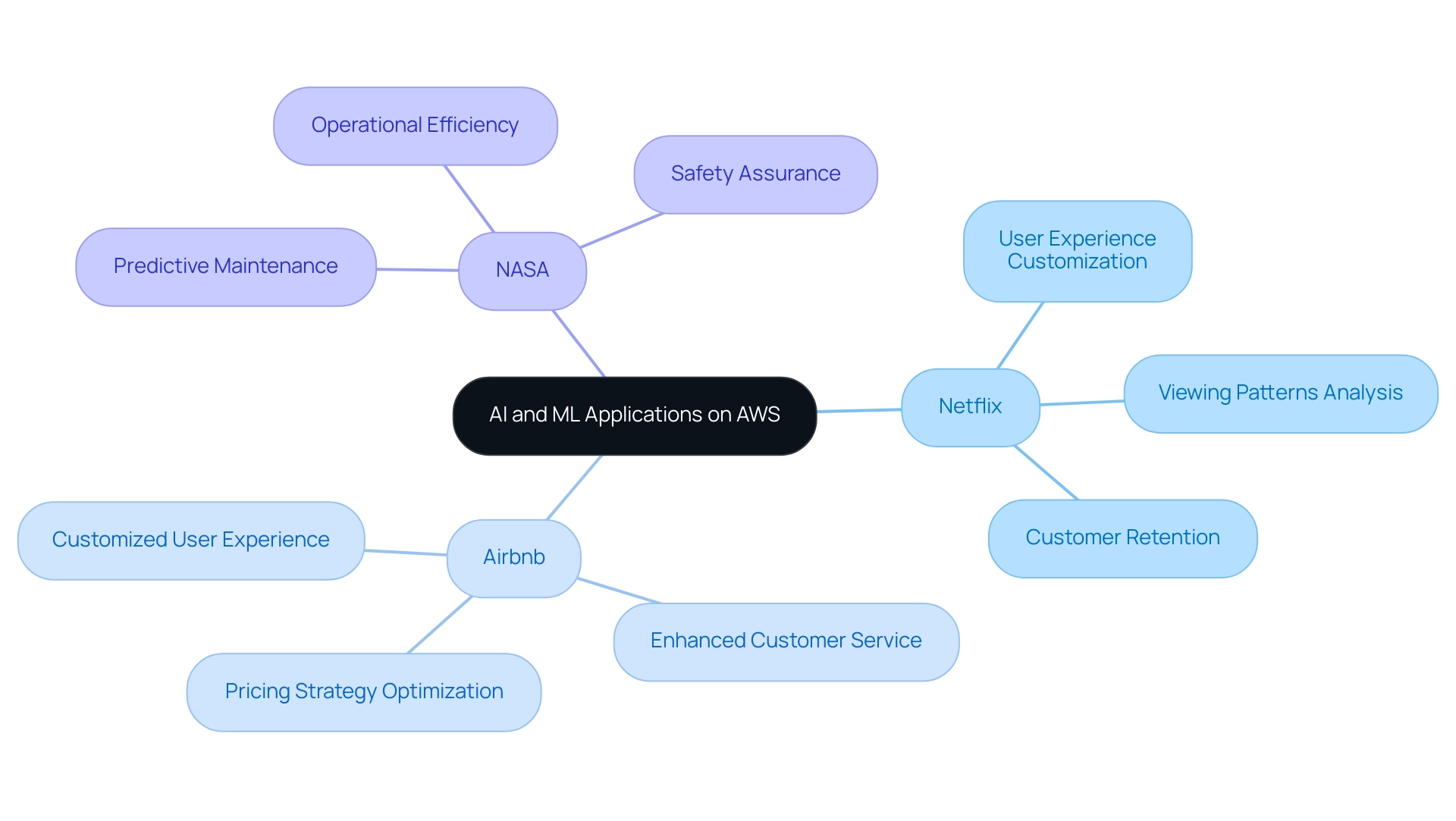
Conclusion
The exploration of Artificial Intelligence (AI) and Machine Learning (ML) within the Amazon Web Services (AWS) ecosystem reveals a landscape rich with opportunities for organizations striving to innovate. By understanding the foundational distinctions between AI and ML, businesses can strategically position themselves to leverage AWS's robust infrastructure, which offers key services like:
- Amazon SageMaker
- AWS Lambda
- Amazon Rekognition
These tools enable efficient development and deployment of AI and ML models, aligning technology initiatives with overarching business objectives.
Implementing best practices such as:
- MLOps
- Performance monitoring
- Cost optimization
is critical for organizations looking to enhance the reliability and effectiveness of their AI/ML projects. Furthermore, pursuing AWS certifications not only validates individual expertise but also ensures that organizations are equipped with the necessary skills to navigate the complexities of AI and ML integration.
Real-world applications, exemplified by companies like:
- Netflix
- Airbnb
- NASA
highlight the transformative potential of AI and ML when effectively harnessed within the AWS framework. These case studies serve as a testament to the competitive advantages that can be gained through strategic implementation of these technologies.
In summary, as organizations continue to invest in AI and ML, understanding and utilizing the offerings of AWS becomes increasingly indispensable. The commitment of AWS to support diverse AI technologies and ensure seamless integration reflects its pivotal role in driving technological advancement and operational excellence in today's digital landscape. Embracing these innovations is not just a matter of keeping pace; it is essential for achieving sustained growth and success in an ever-evolving marketplace.




